|
|
|
Sort Order |
|
|
|
Items / Page
|
|
|
|
|
|
|
| Srl | Item |
| 1 |
ID:
103372
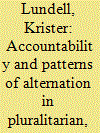

|
|
|
|
|
| Publication |
2011.
|
| Summary/Abstract |
One of the core values in a democracy is the possibility for citizens to bring about alternation in power if they disapprove of the governmental policy. This article examines patterns of alternation and the degree of accountability in three different democratic systems: pluralitarian (characterized by a two-party system), majoritarian (moderately fragmented party system) and consensus (very fragmented party system) democracies. The extent of non-alternation as well as wholesale alternation decreases as we move from pluralitarian to majoritarian and further on to consensus democracy. When alternation is related to election results, majoritarian systems are the most responsive ones, whereas consensus systems generate the lowest degree of accountability.
|
|
|
|
|
|
|
|
|
|
|
|
|
|
|
|
| 2 |
ID:
048465
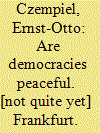

|
|
|
|
|
| Publication |
Frankfurt, Peace Research Institute frankfurt, 1995.
|
| Description |
22p.
|
| Series |
PRIF reports no. 37
|
| Standard Number |
3928965565
|
|
|
|
|
|
|
|
|
|
|
|
Copies: C:1/I:0,R:0,Q:0
Circulation
| Accession# | Call# | Current Location | Status | Policy | Location |
| 041458 | 321.8/CZE 041458 | Main | On Shelf | General | |
|
|
|
|
| 3 |
ID:
086348
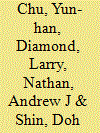

|
|
|
|
|
| Publication |
2009.
|
| Summary/Abstract |
East Asian democracies are in distress. From Bangkok to Manila to Taipei to Seoul to Ulaanbaatar, democratically elected governments in the last few years have suffered inconclusive or disputed electoral outcomes, political strife, partisan gridlock, and recurring political scandals. In 2006-2007, frustrated citizens in Manila and Taipei lost confidence in democratic procedures to the point where they tried to bring down incumbent leaders through extraconstitutional demonstrations, while a crippling political crisis in Thailand in 2006 triggered a military coup.
|
|
|
|
|
|
|
|
|
|
|
|
|
|
|
|
| 4 |
ID:
131004
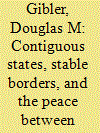

|
|
|
|
|
| Publication |
2014.
|
| Summary/Abstract |
Park and Colaresi find that border stability does not apply to non-contiguous states. This just confirms, again, an argument I have been making in numerous publications since my original "Bordering on Peace" article. Nevertheless, I use this response to present a replication of my original argument, as it applies to contiguous states, and I find strong support for the contention that the democratic peace can better be understood as a stable border peace. I also discuss several different replications of the original argument using different proxies for stable borders. Each confirms that joint democracy is not a statistically significant predictor of conflict once stable borders are also included in the model. In sum, arguments from the territorial peace have been confirmed in multiple analyses, with multiple data sets, using multiple levels of analysis, and this renders Park and Colaresi's attack on the original "Bordering on Peace" a non sequitur in the debate over stable borders as an explanation of democracy and peace.
|
|
|
|
|
|
|
|
|
|
|
|
|
|
|
|
| 5 |
ID:
120171
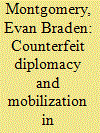

|
|
|
|
|
| Publication |
2013.
|
| Summary/Abstract |
How do policymakers in democratic nations mobilize support for hard-line strategies? Existing answers to this question emphasize the exaggeration of external threats. Yet this overlooks an important dilemma: because democratic citizens expect their leaders to explore peaceful solutions or less aggressive alternatives when foreign dangers are ambiguous, the same conditions that make threat inflation necessary also make it difficult to employ successfully. To mobilize support for hard-line measures when the public wants its leaders to demonstrate restraint, policymakers may therefore attempt to shift blame onto an adversary by using "counterfeit diplomacy." Specifically, democratic leaders may adopt more cooperative or less coercive options than they believe are necessary, but which they anticipate will fail. This approach can be a risky one, however, because an opponent might accept a nation's demands, accede to its conditions, or offer counterproposals in the hope of diffusing support for more confrontational measures.
|
|
|
|
|
|
|
|
|
|
|
|
|
|
|
|
| 6 |
ID:
073548
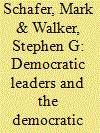

|
|
|
|
|
| Publication |
2006.
|
| Summary/Abstract |
Do the beliefs of leaders make a significant difference in determining if democracies are peaceful and explaining why democracies (almost) never fight one another? Our comparisons of Prime Minister Tony Blair and President Bill Clinton reveal that both leaders view democracies as more friendly than nondemocracies, and they have significantly less cooperative beliefs toward the latter than toward the former, a difference that extends to the behavior of their respective governments during the Kosovo conflict. We also find that individual differences in the operational codes of the two leaders matter in the management of conflict with nondemocracies; the leaders exhibit opposite leadership styles and behavior associated with the domestic political culture of the two states. Overall, these results support the dyadic version of the democratic peace and suggest that the conflict behavior of democratic states depends upon the beliefs and calculations of their leaders in dealing with nondemocracies.
|
|
|
|
|
|
|
|
|
|
|
|
|
|
|
|
| 7 |
ID:
140222
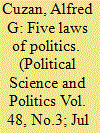

|
|
|
|
|
| Summary/Abstract |
Drawing on more than 500 elections from around the world, this article presents five empirical laws of politics. Four of these laws span democracies and dictatorships, and one sets a boundary between the two. In both regimes the governing party or coalition represents a minority of the electorate. In democracies this minority usually represents a plurality that amounts to about one third of the electorate. Judging by the outcome of the first free elections in regimes undergoing a transition, there is reason to believe that in dictatorships the minority is much smaller. Even as they have an advantage over the opposition, the incumbents experience an erosion of support over time. In democracies this leads to alternation in office, which in turn ensures that across many elections about two-thirds of the electorate gets to see its favorite party or coalition in government from time to time. In dictatorships, during long periods in office, support for the ruling party shrinks to insignificance. Also in democracies, it is rare for incumbents to receive more than 60 percent of the vote, and it never happens twice within the same spell in government. This appears to be a reliable indicator that differentiates all democracies from most dictatorships. The conclusion is inescapable—the dictatorial “passion for unanimity” and illusion of “organic unity” notwithstanding, the state is a plurality. The will of the electorate emerges as a result of competition among political parties.
|
|
|
|
|
|
|
|
|
|
|
|
|
|
|
|
| 8 |
ID:
073656
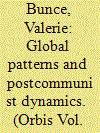

|
|
|
|
|
| Publication |
2006.
|
| Summary/Abstract |
Many of the new democracies that have been formed since the fall of the Soviet Union in 1991 lack what had long been understood as preconditions for the democratic project: an earlier history of democratic politics, high personal incomes, a large middle class, and/or settled borders. The most distinctive aspects of this wave of democratic transitions are rapid regime change and the rise of democracies that exhibit a mixture of both authoritarian and democratic elements. This article explores what these new democracies can teach us about the factors that seem to encourage a transition from dictatorship to democracy, and what factors seem to contribute to its sustainability and institutionalization.
|
|
|
|
|
|
|
|
|
|
|
|
|
|
|
|
| 9 |
ID:
087667
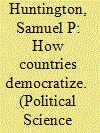

|
|
|
|
|
| Publication |
2009.
|
| Summary/Abstract |
Samuel P. Huntington describes the diverse political processes through which thirty-five countries moved from authoritarianism toward democracy and derives guidelines from these experiences for future "democratizers."
|
|
|
|
|
|
|
|
|
|
|
|
|
|
|
|
| 10 |
ID:
087288
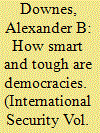

|
|
|
|
|
| Publication |
2009.
|
| Summary/Abstract |
Proponents of the selection effects argument claim that because democratic leaders run a higher risk of losing office than autocratic leaders if they fail to win wars, they are more careful than their authoritarian counterparts in choosing which wars to initiate. The robust marketplace of ideas in democracies also weeds out self-serving or ill-conceived policies and allows democratic leaders to better estimate the chances of victory. Democracies, according to this logic, tend to pick on weak or vulnerable opponents and thus win a disproportionate number of the wars they start. Both quantitative and qualitative evidence, however, challenges this conclusion. The statistical correlation between democracy and victory is not robust to reasonable alternative choices for analyzing the data. In particular, including draws as a war outcome renders statistically insignificant the finding that democratic initiators and targets are more likely to win. In addition, democratic leaders who initiate wars should be optimistic that they will win, but process tracing of the decision by Lyndon Johnson's administration to escalate the Vietnam War (one of these omitted draws) reveals that top officials knew at the time that escalation promised a costly, protracted stalemate, yet they chose to fight anyway. Moreover, domestic politics, if anything, contributed to Johnson's decision to fight in Vietnam despite the poor odds of victory because he believed that pulling out would spark a backlash and destroy his Great Society legislative program.
|
|
|
|
|
|
|
|
|
|
|
|
|
|
|
|
| 11 |
ID:
138306


|
|
|
|
|
| Summary/Abstract |
How and why do regime type and interstate war affect government spending? We argue that a political leader allocates scarce resources between social and military expenditures as a function of their relative efficiency in securing her political survival. We derive four hypotheses concerning how mobilization for and demobilization from interstate war affects government spending differently in democratic and autocratic regimes. Compared to democracies, autocracies should increase military spending to a greater degree during wartime and decrease military spending to a greater extent following a war. Autocracies also should cut social spending more during an interstate war and increase social spending more during the process of demobilization from war than democracies. Our analyses of all states in the international system from 1950 to 2001 yield support for our hypotheses.
|
|
|
|
|
|
|
|
|
|
|
|
|
|
|
|
| 12 |
ID:
118175
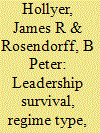

|
|
|
|
|
| Publication |
2012.
|
| Summary/Abstract |
Preferential trade agreements (PTAs) limit member-states' trade policy discretion; consequently, policy uncertainty is mitigated. Reductions in policy uncertainty stemming from accession to a PTA improve the resource allocation decisions of the voters and reduce deadweight losses from the need to self-insure against policy uncertainty. The resultant increase in efficiency improves an incumbent government's-particularly a democratic government's-chance of surviving in office. We test this prediction using survival analysis, adjusting for potential selection biases using propensity score matching. We find robust support for the proposition that governments that sign PTAs survive longer in office than observationally similar governments that do not sign. In addition, we find that this effect is stronger in democracies than in autocracies.
|
|
|
|
|
|
|
|
|
|
|
|
|
|
|
|
| 13 |
ID:
074558
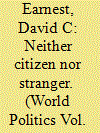

|
|
|
|
|
| Publication |
2006.
|
| Summary/Abstract |
Why would democracies extend to aliens a right they historically have reserved for citizens-the right to vote? Some scholars argue that transnational movements and global norms increasingly moderate how states treat their aliens. If so, this is important evidence of a change in the meaning and content of sovereignty. This article investigates whether democratic states enfranchise their aliens in response to international, transnational, or domestic factors. While the article finds little support for transnational or systemic arguments, it also finds that political parties and judiciaries affect opportunities for aliens in ways the existing scholarship fails to explain. These findings suggest that both comparative and IR scholarship need to revisit their explanations for contemporary citizenship politics in democracies.
|
|
|
|
|
|
|
|
|
|
|
|
|
|
|
|
| 14 |
ID:
178685
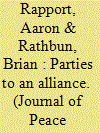

|
|
|
|
|
| Summary/Abstract |
While much research has been done on the domestic determinants of alliance institutionalization, there has been a neglect of the effect of domestic politics, by which we mean contestation between political actors in the same country. We hypothesize that the ideology of the parties governing countries negotiating the terms of security relationships will affect their preferences over the degree and kind of institutionalization seen in alliances. Drawing on previous literature, we argue that rightist parties are more sensitive to sovereignty costs and will therefore insist on maintaining more control over policy than their leftist counterparts. They can assert control either by imposing hierarchical forms of institutionalization when they are a stronger party to an alliance or by avoiding institutionalization altogether if they are the weaker party in an alliance. In contrast, we expect leftist parties to be less sensitive to sovereignty costs and generally favorable to more voice-driven, egalitarian institutions that have institutionalized mechanisms for consensus-building, regardless of their country’s relative power position. Combining the ATOP dataset on alliance design with the Parties Manifesto Project, we find broad support for our hypotheses. Our findings indicate that scholars should pay more attention to the internal ideological contestation within countries, making room for domestic political factors that go beyond regime type.
|
|
|
|
|
|
|
|
|
|
|
|
|
|
|
|
| 15 |
ID:
192026
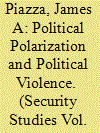

|
|
|
|
|
| Summary/Abstract |
Is political violence and support for political violence more prevalent in democratic societies with high levels of affective polarization? This study argues that affective partisan political polarization fosters dehumanization of opposing partisans, lends a moralistic and zero-sum nature to political life, and facilitates group mobilization. These all produce an environment in which political violence is both more socially acceptable and more frequent. The study tests this assertion using two sets of empirical tests: an original survey of 1,899 US residents and a cross-national time-series analysis of eighty-three democracies. It finds that in the United States, Democrats who express aversion toward Republicans are 8% more likely to express support for the use of political violence, whereas Republicans who express aversion toward Democrats are 18% more likely to endorse political violence. Furthermore, in the cross-national analysis, democracies characterized by higher levels of affective partisan political polarization are 34% more likely to experience frequent political violence.
|
|
|
|
|
|
|
|
|
|
|
|
|
|
|
|
| 16 |
ID:
075226
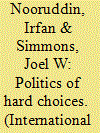

|
|
|
|
|
| Publication |
2006.
|
| Summary/Abstract |
A central component of International Monetary Fund (IMF) programs is reducing government budget deficits. We ask how domestic political considerations shape the distribution of cuts made by governments in IMF programs. Our central finding is that IMF programs shrink the role played by domestic politics. While democracies allocate larger shares of their budgets to public services in the absence of IMF programs, the difference between democracies and nondemocracies disappears under IMF programs. This result has important implications for our understanding of government spending priorities under different resource constraints.
|
|
|
|
|
|
|
|
|
|
|
|
|
|
|
|
| 17 |
ID:
141853
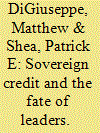

|
|
|
|
|
| Summary/Abstract |
In this article, we contend that the “democratic advantage” literature (i) exaggerates the potential political backlash from credit downgrades in democracies; and (ii) overlooks the importance of sovereign credit to nondemocratic leaders. We argue that nondemocratic regimes receive a higher marginal political benefit from credit compared to democratic regimes. Consequently, changes in credit prices or credit access affect nondemocratic leaders' tenure more than democratic leaders' tenure. To test this argument, we provide the first statistical examination of the electoral punishment mechanism of the “democratic advantage.” Our duration analysis shows that credit downgrades increase nondemocratic leaders' vulnerability more than that of their democratic peers. Our research reinforces the growing concerns about the conventional views about regime type, domestic constraints, and leaders' preferences toward sovereign credit and other political processes.
|
|
|
|
|
|
|
|
|
|
|
|
|
|
|
|
| 18 |
ID:
115316


|
|
|
| 19 |
ID:
113537
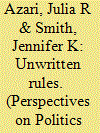

|
|
|
|
|
| Publication |
2012.
|
| Summary/Abstract |
Scholars of the developing world have driven a surge of interest in unwritten or informal institutions as determinants of political outcomes. In advanced industrial democracies, by contrast, informal institutions often remain consigned to the analytic margins. This article makes a case for greater attention to informal political institutions in established democracies, and it introduces a theoretical framework to support such analysis. Informal institutions, understood as the unwritten rules of political life, are seen to perform three functions: they complete or fill gaps in formal institutions, coordinate the operation of overlapping (and perhaps clashing) institutions, and operate parallel to formal institutions in regulating political behavior. These three roles of informal institutions are associated with different characteristic patterns of institutional stability and change. The article illustrates its theoretical framework with case studies from American politics, the subfield in which formal-institutional analysis has flourished most. These cases are the historical norm of a two-term presidency (a completing institution), the unwritten rules of the presidential nomination process (coordinating institutions), the informal practice of obstruction in the Senate (a parallel institution), and the normative expectation that presidents should address the public directly (which performs all three functions).
|
|
|
|
|
|
|
|
|
|
|
|
|
|
|
|
| 20 |
ID:
140812
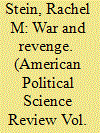

|
|
|
|
|
| Summary/Abstract |
While we know much about what differentiates the conflict behavior of democracies from autocracies, we know relatively little about why some democracies are more belligerent than others. In contrast to existing studies, I argue that it is public opinion and not institutions that drives these differences. All democratic leaders have an incentive to take public opinion into account, but public opinion is not the same everywhere. Individuals’ attitudes towards war are shaped by core beliefs about revenge, which vary across countries. Leaders with more vengeful populations will be more likely to initiate conflicts because they generate popular support for war more effectively. Using retention of capital punishment as a proxy for broad endorsement of revenge, I find that democracies that have retained the death penalty for longer periods of time are significantly more likely to initiate conflicts. This research has important implications for existing theories of democracy and war.
|
|
|
|
|
|
|
|
|
|
|
|
|
|
|
|
|
|
|
|
|